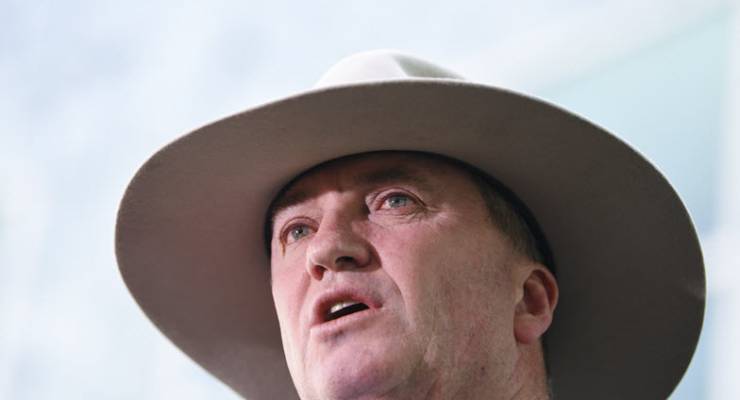
If it wasn’t obvious before to his colleagues, it surely is now: Barnaby Joyce’s judgment is shot. He is no longer making bad calls, he’s making literally the worst call he could possibly make in every circumstance, as if by careful calculation.
The result is that, virtually every day since last Friday, Joyce himself has been the one to take steps to keep his story running in the media. And none more so than his decision to give an interview angling for sympathy to Fairfax, which will keep him on the front pages for another 24 hours. It’s almost as if Joyce fears the darkness that will descend on him if he’s no longer dominating the media cycle, however much it drowns out what the government actually wants to talk about, however much it damages his party and the Liberal Party. As if he feels he will stop existing if the media is no longer discussing him. Barnaby, Barnaby, Barnaby. That’s all that matters.
It’s rare to see political solipsism of this magnitude. And rare, as well, to see solipsism coupled with such complete lack of self-awareness. Indeed, I never thought you could be a solipsist and completely without capacity for self-reflection, but Joyce has broken new epistemological ground here.
As has already been pointed out by LGBTIQ people and marriage equality supporters, Joyce’s complaint “there is somehow an inference that this child is somehow less worthy than other children” (itself an odd straw man — who has “inferred” that? Is Joyce projecting onto others?) is laughable hypocrisy given his hostility to marriage equality.
Is this just down to Joyce’s own psychology, one surely influenced by long-term exposure to the unreality of Canberra? Or is it something more? The Nationals are unique in Australia in being a sectional party. That is, its entire purpose is the promotion of a sectional interest — rural communities and agriculture. While other parties gesture toward sectionalism — Labor and working people; the Liberals and business — and have deep financial connections with vested interests like unions and the corporate sector, they purport to work toward the national interest and universal values. The Greens, similarly, embrace a universal political philosophy, even if they tend to represent urban progressives. Nick Xenophon’s party probably comes closest to sectionalism, because of its dominant focus on South Australia, but its primary philosophy — protectionism, anti-gambling, parliamentary centrism — is ostensibly universal too.
But the Nats are about the bush. Not all of the bush, either: mainly white male farmers. Joyce’s infamous Agriculture White Paper, with the white heterosexual family on the cover, summed it up well. There’s greater diversity in the party outside Queensland and NSW, but ultimately the Nats are about delivering for white male farmers and the extractive industries in which they work. Given the number of Nationals MPs who are former farmers or have worked in agribusiness themselves, this means the Nats aren’t merely sectionalist, their political philosophy is self-focused: they’re about helping themselves and people like themselves.
Rather than being at odds with the Nationals’ core values around the heterosexual family, perhaps Joyce is the purest form of them — the essence of a political philosophy that sees power as a tool to use to help oneself and people like you, rather than the national good. Joyce is the Nationals’ id, seemingly untrammelled by any self-awareness or restraint imposed by political calculation or even rational thought, that is aware only of its own existence and own needs and acts to pursue them.
In any case, it must be clear even to Joyce’s supporters within the parliamentary party that with his judgment so badly impaired and his focus so relentlessly inward, his removal is the only logical option. And if the Nats don’t do it, there are plenty of Liberals who will act to ensure he is forced out by a process of strategic leaks. The cost to the government of delaying the inevitable will only grow from here.








Crikey is committed to hosting lively discussions. Help us keep the conversation useful, interesting and welcoming. We aim to publish comments quickly in the interest of promoting robust conversation, but we’re a small team and we deploy filters to protect against legal risk. Occasionally your comment may be held up while we review, but we’re working as fast as we can to keep the conversation rolling.
The Crikey comment section is members-only content. Please subscribe to leave a comment.
The Crikey comment section is members-only content. Please login to leave a comment.